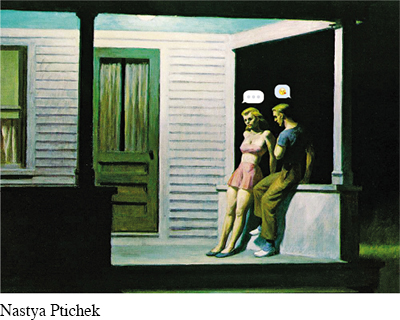9.25
Do You Like Me? Click Yes or No
Jason Edward Harrington

Jason Edward Harrington is a regular contributor to the online humor site McSweeny’s Internet Tendency, from which this 2011 satirical short story is taken. He worked for six years as a Transportation Safety Administration airport screener, before quitting to write the exposé “Dear America, I Saw You Naked: And Yes, We Were Laughing. Confessions of an Ex-
To: Alice
First day of school. Sucks, huh? This class is so boring. I hate long division. Anyway, I like you. I set up a Tumblr for you while we were supposed to be doing #5. Just a poll with your name as the site’s title:
ALICE
Do you like me?
Click yes or no.
Yes: 0 votes
No: 0 votes.
To: Bobby
Yes: 1 vote
No: 0 votes
I’ve liked you ever since we had recess together last year. This is awesome! Can’t wait for lunch next period. We should hold hands. Here’s a heart I just downloaded for you: <3
P.S. I just liked the Alice site on Facebook.
To: Alice
Thanks for the heart, and I can’t wait to hold hands, but I really didn’t want to take this to Facebook, yet. The Alice site isn’t ready, and I didn’t want anyone linking into it at this phase. I can see over Tim Mackey’s shoulder that he’s looking at the Alice site right now. My problem with this is that a good portion of the class got the news that you like me before even I did. Communication is key, here.
To: Bobby
Sorry I Facebook liked the Alice site. I honestly don’t see why that’s such a problem, though. The comments have been overwhelmingly positive. I was even putting the finishing touches on a joint Tumblr account, in case we really did go public with this before the bell rang, but I’ll just put the brakes on that for now.
P.S. — The site Nestor set up for Jen had links going in right away, and he didn’t make a big deal about it. And that site was SEO, too.
To: Alice
5 I like you — not in a search-
To: Bobby
I retweeted your tweet, and take full responsibility for this. The buzz was forced there, and I see that now. We have to keep expectations low on a venture like this — position ourselves to exceed expectations (think Brad and Jess). We’re on the same page now: mum’s the word, at least until next period.
To: Alice
Well, the cat’s out of the bag, and we have backers, now — the Alice and Bobby site is being overrun by comments — so we may as well just stay the course. There’s a lot of interest in us; I’m even seeing some comments from the 5th graders. We’re hot right now, Alice, but my main concern is overvaluation — a roomful of kids expecting chocolate milk, and we show up with plain. We’re not even sure if we look good on paper at this point, let alone how we’d scale to the lunchroom were we to go public at the bell, which is why I really wanted to stay bootstrap on this, crazy as that may sound.
To: Bobby
I’m a little confused. Are you saying you’re embarrassed to be seen with me at lunch? You’re right about one thing, though: we do have a lot of people backing us on this, and I think it would be a mistake to show any skittishness on your part. With so many of the other kids invested in Bobby and Alice, do you really want to appear bearish, now? We could at least try pivoting and re-
To: Alice
It’s not about how we look in the lunchroom, Alice. Just read the comments. “Are you two going to kiss at recess?” “Alice and Bobby sittin’ in a tree.” “Love.” “Marriage.” There’s even talk of a baby carriage, here. Do we even know the first thing about any of this? I mean, really? I heard how babies are made from Joey Demetrelis during recess, but I’ve seen people trying to collapse baby carriages, Alice, and I’m not sure we even have the right skill set for that. And k-
To: Bobby
10 You know what? FINE. You’re right. We were in over our heads to begin with on this — now we’re underwater. I guess it’s true what they say: it’s hard to recognize a bubble until after it bursts. I’m posting the announcement on our ill-


Kiev artist Nastya Ptichek incorporates the modern mechanisms and language of technology into classic works of art. Here, emojis (a simple ellipsis on the left, a face winking and blowing a kiss on the right) make an appearance in Edward Hopper’s 1947 Summer Evening.
OVERVIEW
The Alice and Bobby Bust:
Problem Analysis, Where We Failed
Inexperienced management.
Critical communication problems between Bobby and me.
Page 836Grew too fast, too early.
Should have built on WordPress.
Lack of passion and motivation (especially on Bobby’s part).
Unconventional accounting metrics diminished our integrity with the other kids.
Ultimate inability to translate our popularity into a viable relationship model.
Failure on my part to take into account the inherent intractability of the total grossness of boys.
Understanding and Interpreting
Trace the relationship between Bobby and Alice, focusing on:
How their relationship started
The conflicts they faced
The causes of the failure of their relationship
One key factor that distinguishes a “satire” from something that is just “funny” is that a satire almost always has an intended target for its humor, something specific that it is making fun of and commenting on. What is Jason Edward Harrington trying to communicate about modern relationships in today’s social media landscape? What evidence do you have to support your conclusion?
Analyze Alice’s character using evidence from the “Overview” at the end of the piece. Based on the information provided about Bobby in the rest of the piece, is her assessment of Bobby accurate?
Analyzing Language, Style, and Structure
The following are common elements of satire. Locate an example of each from the text and explain how the element assists Harrington in making his point about modern relationships. If you need definitions for these terms, consult the Glossary on page 1020.
Incongruity
Reversal
Hyperbole
Parody
When does the author present aspects of the characters that sound like elementary school students and when does he make them seem like adults? How does this verbal irony lead to humor and help to establish the point Harrington is trying to make?
Connecting, Arguing, and Extending
Try writing a satirical piece about your experiences with digital communications technologies. You might use the techniques of incongruity, reversal, hyperbole, and parody, which are defined in the Glossary. You might also rely on situational or dramatic irony, which are described in the Workshop on page 838, and can be found in the Glossary.
Clearly there was a lot of cell phone use going on in Bobby and Alice’s classroom. Identify your own school’s policy toward cell phone use, evaluate the policy’s effectiveness, and discuss whether the policy is appropriate in the twenty-
first century.